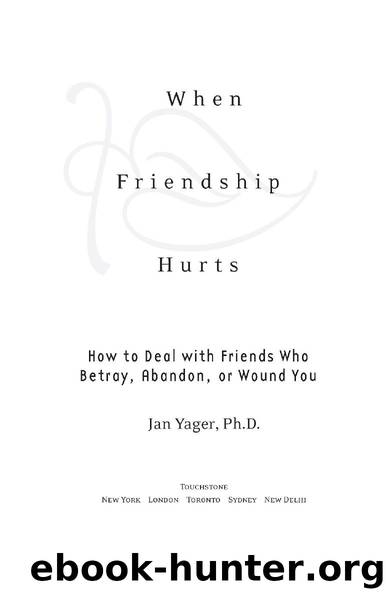When Friendship Hurts by Jan Yager

Author:Jan Yager
Language: eng
Format: epub
Publisher: Touchstone
Published: 2010-05-11T00:00:00+00:00
Chapter 4
It’s All in the Family
You may think you choose your friends because you want to have a wonderful, supportive relationship with someone with whom you share a lot. But if you have unresolved issues, your friends may be a manifestation of your unconscious conflicts. If your parents made you feel unloved and unlovable, if they were critical or negative or hurt you emotionally or physically, you may unconsciously choose what is familiar to you and what you have come to expect: the negative.
Now not all your friendships may be harmful or destructive. Indeed, many may be supportive, wonderful, and positive. There might be just one that is negative, one friend who has betrayed you. It could be a casual friend at work. It could be a close or best friend in your personal life. That one negative friendship could be the exception, not the rule. But even one destructive friend is too many in anyone’s life.
However, first you have to recognize patterns from your childhood. This is not an easy task and may require the help of a professional. A therapist can often help identify the early-childhood traumas that get woven into our unconscious like roadmaps for future behavior. Breaking the negative relationship patterns is as difficult as breaking any lifelong habit. You really have to work at it.
Of course, there are different kinds and degrees of bad family relationships. Therapist Susan Forward, co-author with Craig Buck of Toxic Parents, points out that all parents do things wrong from time to time when it comes to raising their children, but the toxic parent has a pattern of verbal, sexual, or emotional abuse toward their child or children that leaves the child with “damaged self-esteem, leading to self-destructive behavior. In one way or another, they almost all feel worthless, unlovable, and inadequate.” 1
Untreated, these children grow up to have tremendous self-esteem problems. As we saw in the last chapter, low self-esteem will have a negative impact on friendships, causing a person to select friends who will perpetuate the destructive patterns from childhood. Low self-esteem could even cause someone to feel unworthy of having any friends. For example, 50-year-old Claudia, a married computer programmer with two grown children who, starting when she was 10 was sexually abused for four years by her older brother, describes how her family relationships and home life—which she described as “rigid, tense, competitive, intimidating, dismissive and denying of emotions, and much teasing”—have affected her friendships:
Sexual abuse was just one contributor to my poor self-esteem, but sexual abuse consolidated my self-perception as “being worthy of poor treatment.” I am cautious about entering into friendships. I “sexualize” any friendly gestures by men. I am quick to challenge disagreeable behavior or views rather than let them slide and enjoy what is there to enjoy. I don’t believe I’m important to others [and] do not always keep in touch. I am distrustful. [I wonder:] Does someone like me because they like me, or are they just softening me up with
Download
This site does not store any files on its server. We only index and link to content provided by other sites. Please contact the content providers to delete copyright contents if any and email us, we'll remove relevant links or contents immediately.
Should I Stay or Should I Go? by Ramani Durvasula(6792)
The Lost Art of Listening by Michael P. Nichols(6480)
The Rosie Project by Graeme Simsion(5197)
We Need to Talk by Celeste Headlee(4876)
Beartown by Fredrik Backman(4427)
Suicide Notes by Michael Thomas Ford(4274)
Hunger by Roxane Gay(4228)
Ego Is the Enemy by Ryan Holiday(3999)
I Love You But I Don't Trust You by Mira Kirshenbaum(3231)
Mummy Knew by Lisa James(3172)
Crazy Is My Superpower by A.J. Mendez Brooks(2863)
Girl, Wash Your Face by Rachel Hollis(2825)
The Complete Idiot's Guide to Coping With Difficult People by Arlene Uhl(2824)
Toxic Parents by Susan Forward(2810)
Not a Diet Book by James Smith(2731)
The Hard Questions by Susan Piver(2555)
Name Book, The: Over 10,000 Names--Their Meanings, Origins, and Spiritual Significance by Astoria Dorothy(2494)
The Gaslight Effect by Dr. Robin Stern(2355)
The Social Psychology of Inequality by Unknown(2312)
